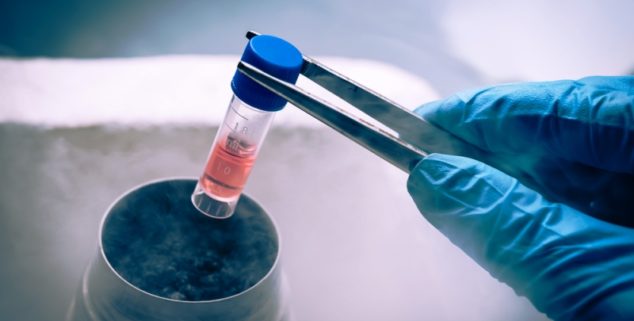Opinion
Stem cell initiative: Save lives and energize the economy
 A researcher handles a liquid nitrogen bank containing suspended stem cells. (Photo: Elena Pavlovich, via Shutterstock)
A researcher handles a liquid nitrogen bank containing suspended stem cells. (Photo: Elena Pavlovich, via Shutterstock)In our new financial reality, our state and you as voters are faced with tough decisions. Come November, you will decide the fate of California’s stem cell institute. This decision has never been more important to the future of California’s health care, for the patients and their families, than it is now.
Californians overwhelmingly approved the state’s first stem cell initiative in 2004, with nearly 60% of the vote, and widespread support from patient advocacy organizations, labor, business and elected officials. The 2004 initiative established the California Institute for Regenerative Medicine (CIRM) to fund medical research and the development of new treatments and cures.
If Californians do not pass Proposition 14, vital lifesaving research will come to a halt.
CIRM funding has advanced research and therapy development for more than 75 different diseases and conditions, more than 90 clinical trials, more than 1,000 medical projects at 70 institutions across California and nearly 3,000 published medical discoveries. This investment has already saved and improved lives, including a high school student who was paralyzed in a diving accident and was able to regain function in his upper body and go on to college, a mother who went blind from a genetic disease has had some of her eyesight restored, two FDA-approved cancer treatments are already saving lives, and many more.
As funding for California’s stem cell research program has now run out, Californians have a critical opportunity to pass the 2020 stem cell initiative — Proposition 14 — to continue to advance lifesaving research and treatment development. Proposition 14 just recently qualified for the November ballot with early support from more than 65 patient advocacy organizations, the University of California and Nobel Prize winners.
If Californians do not pass Proposition 14, vital lifesaving research will come to a halt. Medical discoveries won’t be able to progress to clinical trials, delaying lifesaving and life-changing treatments for cancer, diabetes, heart disease, Alzheimer’s, Parkinson’s, infectious diseases like COVID-19 and more for years or decades.
Additionally, not passing Proposition 14 would eliminate a critical economic and jobs stimulus for our state.
Arguably, our state leaders are rightfully concerned about the state budget amid the current landscape. But as we enter a period of economic crisis, this bond measure will act as an economic recovery and jobs stimulus.
It is not a tax; it is a general obligation bond that will be repaid by the state, over decades, beginning in 2026.
Proposition 14 will increase the amount of state funds available to tackle other issues for the next 10 years by increasing state tax revenues through 2030 — potentially providing more state revenue than the cost of bond payments during that time. To date, California’s stem cell research program has generated $10.7 billion in increased state economic activity and hundreds of millions in additional state revenues. California’s stem cell research program also creates tens of thousands of jobs at every level — from lab technicians and maintenance workers to nurses and physicians.
Proposition 14 is exactly the kind of long-term investment we should make now to rebuild our economy. The initiative was specifically designed to be fiscally responsible. It is not a tax; it is a general obligation bond that will be repaid by the state, over decades, beginning in 2026 — a full five years after its passage.
We can’t afford not to fund Proposition 14.
Chronic diseases are the leading cause of death and the leading driver of annual health care spending and bankruptcies. In California alone, more than 30% of the state’s budget is spent on health care. With this cost rising every year, it is a growing strain on California families and our state budget.
If we hesitate to fund proper research to develop cures for chronic illnesses, our health care costs will financially drain California families, as well as our struggling state budget. Reducing the cost of treating just 6 of 80 major chronic diseases or injuries by 1-2% would pay for the Initiative twice over.
The decision you make in November will have lasting impacts on the state funds available to tackle priorities California needs to address now, and in the future, including housing, education, or the environment. Proposition 14 will generate additional revenue to help address these issues now, and potentially save California tens of billions for the future.
Proposition 14 will cost the state an average of less than $5 per person, per year – about the cost of a bottle of aspirin. That is a small price to pay to potentially save millions of lives and tens of billions of dollars in health care costs in the coming decades. At the end of the day, Proposition 14 could save your life or the life of someone you love — how can we afford not to make this investment?
—
Editor’s Note: Bob Klein is chairman of Californians for Stem Cell Research, Treatments and Cures.
Want to see more stories like this? Sign up for The Roundup, the free daily newsletter about California politics from the editors of Capitol Weekly. Stay up to date on the news you need to know.
Sign up below, then look for a confirmation email in your inbox.

Leave a Reply